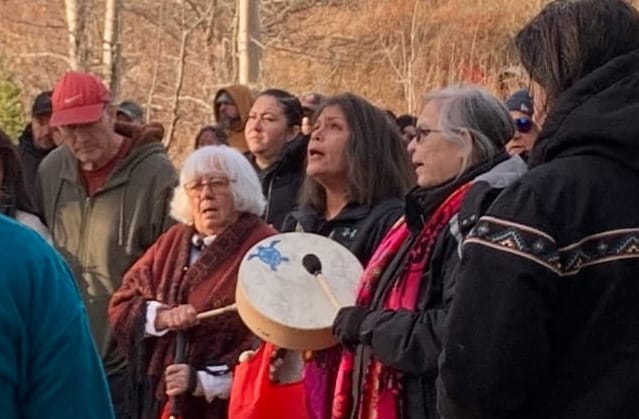Native ceremonies help curb substance abuse
An effort to fight substance abuse through the use of Native ceremonies is being undertaken by the Wabanaki Nation Foundation, a nonprofit cultural preservation and healing entity.
An effort to fight substance abuse through the use of Native ceremonies is being undertaken by the Wabanaki Nation Foundation, a nonprofit cultural preservation and healing entity. Kani Malsom, president of the foundation, says the organization is aiming to replace a dependence on drugs and alcohol with cultural ceremonies and teachings. "We're preserving our culture, but we're helping heal our people while preserving our culture."
Rexford Nicholson of South Princeton, one of the board members of the foundation, says, "We're trying to get people to a higher spiritual understanding, and to lay the foundation is important."
One of the ceremonies that is being conducted regularly by members of the foundation is the sweat lodge, a purification ceremony that "detoxifies our bodies and purifies our spirits and bodies," Malsom says. Rocks heated on a fire are brought into the sweat lodge, with water poured on them to make steam. The ceremony is made up of four rounds, one for each direction. During the first round, to the east, the eagle spirit is called on and prayers are offered for the children; during the second round, to the south, thanks is given for creation, Mother Earth, and prayers are offered for all women to respect themselves and to be respected by men. The third round, to the west, is for calling on the grandfathers of the people to bring medicine and healing, with prayers offered for all sick people and for men, to respect themselves, the women and children. The fourth round, to the north, calls on the white bird spirit, with prayers for forgiveness, for people to forgive themselves and those who hurt them.
"It's a really intense ceremony. People feel really cleansed," says Malsom. "They feel like a new person when they leave the lodge. It's one of our greatest tools for combatting drugs and alcohol."
A sweat lodge is conducted on Saturdays on land that Malsom owns near the tribal office building, and anyone is welcome to participate. "The four colors of man are color blind," says Malsom. "We look at the color of your heart."
Other ceremonies include four-day fasts and the sun dance, and youth drumming is held on Saturday nights. The building of a Passamaquoddy longhouse on the property is planned, which would be used for language and cultural teaching. The group stresses the importance of education in "helping to adapt better to society and contribute to society in a clean and healthy way," says Malsom. Members of the foundation plan to work with area schools and institutions, and this summer a re-enactment village, showing how the tribe's ancestors lived off the land, may be built. The group also plans a gift shop that would purchase and sell baskets and other crafts, but they would not be seeking to compete with area businesses.
Other activities planned include cultural excursions with elders and youths to visit ancestral sites and places such as the Abbe Museum in Bar Harbor, day camps to engage young people in traditional sports and games, community service activities that may include graffiti cleanup, village beautification, planting trees and restoration of ancestral sites. Youth activities could include a traditional arts and crafts course, open gym nights and wilderness excursions.
Malsom believes that drug and alcohol abuse, a significant problem in the area, stems from a lack of jobs but also a lack of pride and cultural understanding. He maintains that many Natives have been indoctrinated into western culture and have lost the communal identity that brings them to help one another. He explains that sociologists have developed several concepts about Native peoples: the assimilated Indian, the traditionalist, the new-found traditionalist, the international human being and the lost identity Indian. Traditionalists hold a grounded foundation about their identity, ceremonies and language; new-found traditionalists have recently moved back to the reservations and are actually racist against non-Natives; international human beings try to combine both western and traditional Native societies; lost identity Indians don't know where they belong, often turn to drugs and alcohol, and are met with racism by non-Natives and internalized racism in their own communities; and assimilated Indians have adopted western culture, are well-educated, are ashamed of being Native and are racist toward other Native people.
Although he thinks many of the youth are lost identity Indians, Malsom believes that more are turning toward the tribe's ceremonies and culture, with "a slight decrease" in drug and alcohol use.
The Wabanaki Nation Foundation is also reaching out to other groups in the area. Malsom says they are partnering with the Pleasant Point Youth and Recreation Department, along with the Vineyard Center, a Christian fellowship in St. Stephen. The organization is hoping to grow its relationship with the University of Maine at Machias and Washington County Community College.
The foundation also has helped homeless people, with meals and a place to stay, so they could get back on their feet. "We pick up the slack that the tribal office doesn't cover," says Malsom.
"We're all in the same boat together. We need to live together," he observes. "Once we get rid of racism and prejudices, we can make a difference in Washington County by helping one another, respecting each other's culture."

